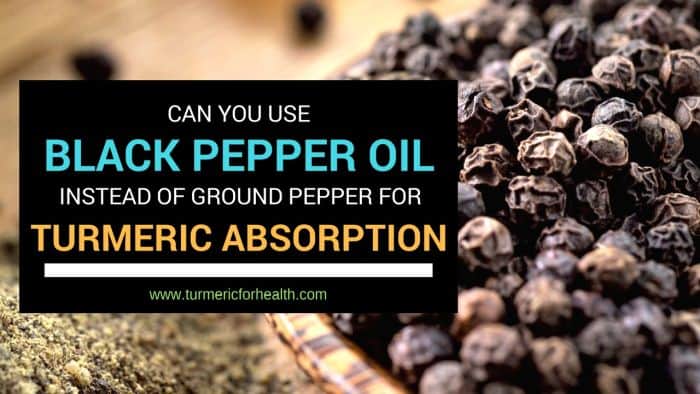Turmeric is poorly absorbed in the body and to tackle that limitation it is recommended to take it with black pepper or fats / oils.
Both black pepper and oil help the body absorb turmeric and to provide health benefits.
Several of our readers have asked whether using black pepper essential oil will be as effective as using ground black pepper to enhance turmeric absorption.
Black pepper essential oil contains fatty acids that theoretically may assist in increasing curcumin/ turmeric’s absorption. But there is insufficient clinical or pre-clinical evidence to prove this effect.
Also, there is no definitive evidence to confirm the dosage limits and safety of consuming black pepper essential oil.
Let us explore these facts in detail with scientific evidence.
Table of Contents
Can you Take Black Pepper Oil instead of Black Pepper Ground with Turmeric?
Use of ground black pepper for turmeric absorption is preferred rather than using black pepper essential oil. Black pepper essential oil does not contain piperine, the bioenhancer which is proven to increase the bioavailability of turmeric. The effects of black pepper essential oil on turmeric’s absorption have not been evaluated thoroughly by research.
Turmeric bioavailability can be increased by using both piperine and healthy oils
The low bioavailability of turmeric and its compound, curcumin is a barrier to accessing its many health benefits.
Several methods of improving the availability of turmeric are being researched. These include
- Changing the route of administration
- Nanoformulations
- encapsulating in liposomes or some polysaccharides
- Intake with bioenhancers like Piperine
- Consumption along with substances in which turmeric is soluble (lipids)
Black pepper essential oil does not contain piperine
The main reason why turmeric is taken with black pepper is due to its piperine content. Piperine enhances the availability of turmeric and its active ingredient, curcumin which can result in a more profound therapeutic effect.
However, unlike black pepper, the essential oil hardly contains any piperine.
The extraction of essential oil from the black pepper is usually done by the process of hydrodistillation. In this process, distilled water is added to black pepper powder and heated. The oil, which is volatile, gets evaporated and the non-volatile piperine is left behind.
Volatile components are then condensed, and the oil is separated from water.
Also, the chemical analysis of the essential oil of black pepper shows no presence of piperine.
The essential oil forms 0.4%-7% of black pepper depending upon variety, place and method of cultivation and is responsible for the aroma of black pepper.
As it does not contain piperine, black pepper oil cannot confer the same benefits as provided by ground black pepper, which has 2%-7.4% piperine content.
Safety concerns with Black Pepper Essential Oil
Another way of improving the bioavailability of turmeric or curcumin is to combine it with healthy fats and oils.
One of the oldest systems of medicine, Ayurveda, recommends the intake of turmeric with ghee or clarified butter which provides healthy fats.
Curcumin or turmeric is poorly soluble in water and readily soluble in lipids. When turmeric is combined and dissolved in fats, it can get digested by intestinal enzymes more efficiently, get absorbed and enter directly into the blood.
Thus, the consumption of turmeric with oils or foods containing oil is preferred for better absorption. The only thing to take care of here is the type of oil.
Oils or fats which do not have adverse effects or disrupt lipid profiles and confer health benefits should be used.
Black pepper essential oil does not have any serious adverse effects and is beneficial for health. It has anti-inflammatory, antioxidant, antimicrobial and analgesic effects.
One study investigating the components of black pepper essential oil reveals that it is rich in saturated fatty acids.
But the percentage of the oil content has not been compared with conventional dietary oils; we don’t know how much black pepper essential oil we would need to utilise its fat content for turmeric’s absorption. And essential oils are unstable or volatile in comparison to cooking oils which are ‘fixed’ or stable.
Also, if a large quantity of black pepper essential oil is required; it has not been ascertained whether such amounts are safe for human consumption.
Black pepper essential oil also contains some aromatic compounds such as terpenes and sesquiterpenes; preliminary research suggests that they may help in curcumin’s absorption in the skin. No data is available on its safety and effect in oral consumption.
Essential oils of spices are concentrated in nature and can erode the oral lining or skin if not diluted before use. Not all essential oils are safe for oral consumption.
There is no definitive evidence that can confirm the safety of consuming black pepper essential oil orally and what amount would be safe for consumption.
Theoretically, black pepper essential oil may contain components that help in absorption of curcumin, but this has not been evaluated in an animal model or human studies.
Conclusion: Ground Black Pepper or Black Pepper Essential oil?
Numerous studies have shown that piperine from black pepper can increase turmeric absorption. There is sufficient evidence available, and one can be sure of the increased availability of turmeric or curcumin when taken with ground black pepper.
Black pepper essential oil does not contain piperine. It has a saturated fat content, components of which are theoretically known to improve curcumin’s absorption. But this has not been proven clinically.
Plus, there is no clear evidence about what dosage range of black pepper essential oil is safe for consumption, can it be used without a base oil and will the safe dose range be enough or effective in improving turmeric’s absorption?
There are not enough preclinical or clinical studies which can prove the enhanced absorption of turmeric with black pepper oil.
Based on the above-listed facts, it can be said that it is better to use ground black pepper for turmeric absorption rather than black pepper essential oil for an assured effect.

